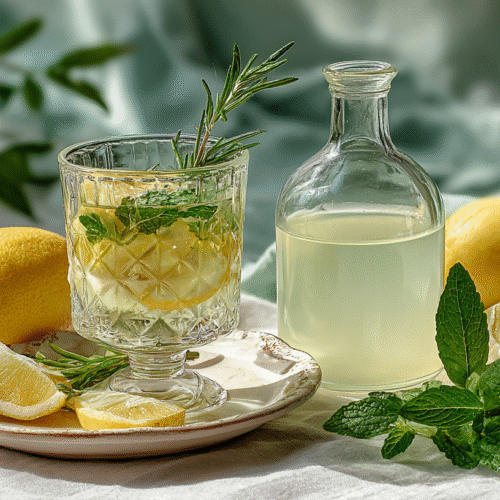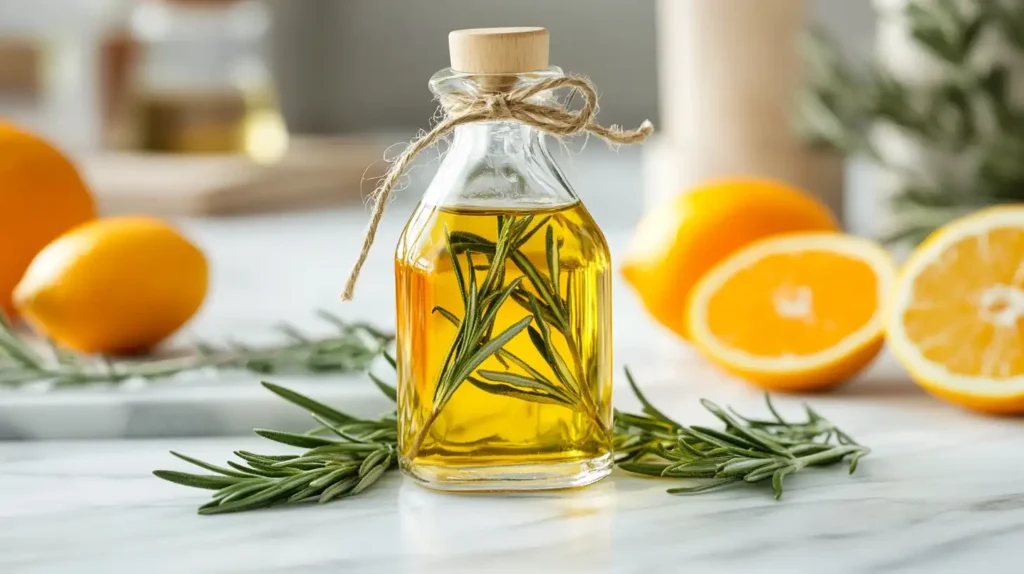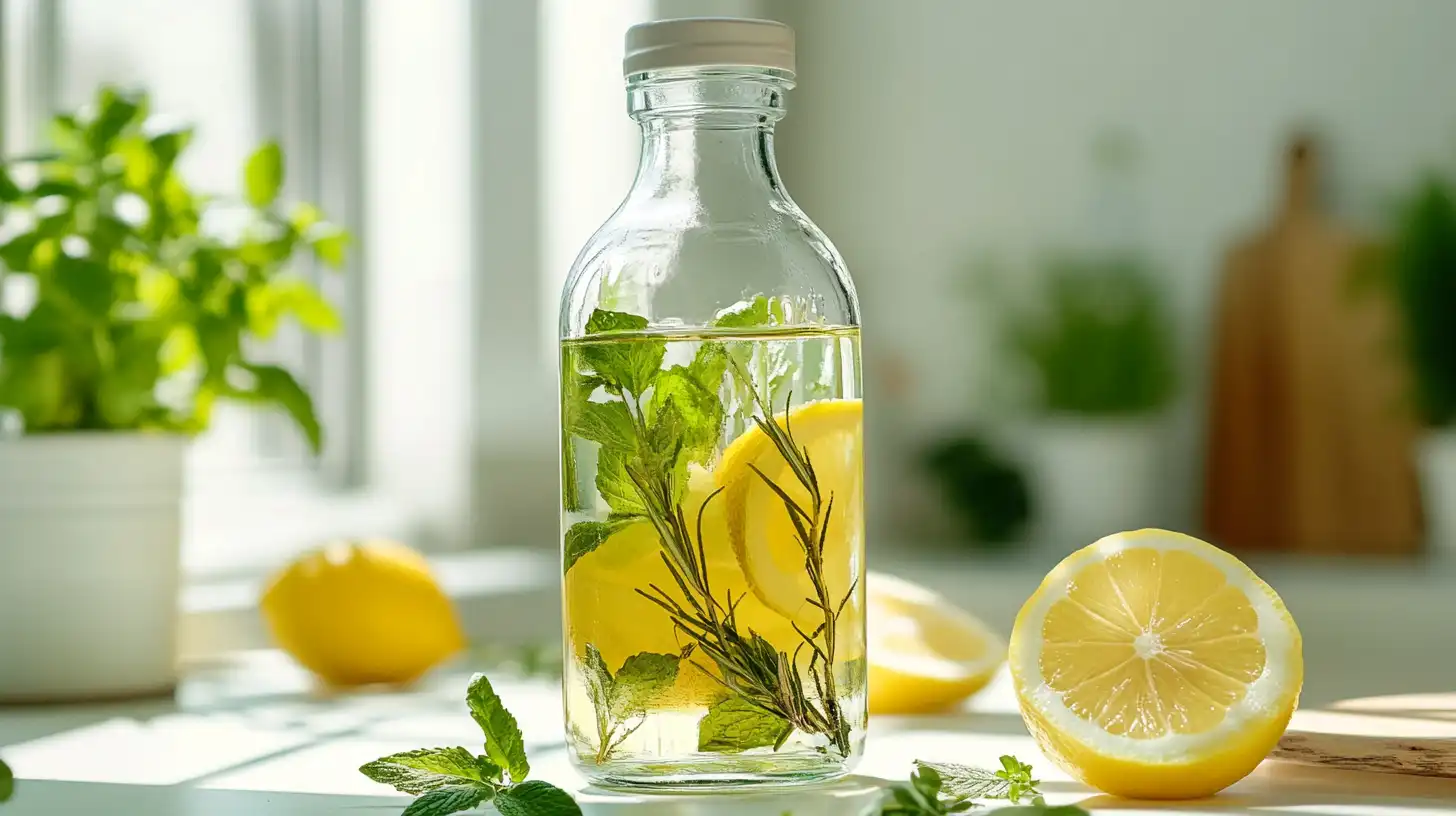Herbal cordial recipe lovers have always been onto something with this refreshing, tasty, and yet healthy drink! It has been a popular drink in Asia and Europe, starting with medicinal purposes and gaining popularity for its tangy and customizable taste. With my Southern upbringing, my usual go-to drink is iced tea lemonade, but ever since discovering herbal cordial, I’ve found my second go-to beverage. It’s the perfect non-alcoholic drink to satiate my thirst after a long summer day, preferably while sitting on the porch and watching the lazy evening sun make its way to the horizon. There are different variations of this, but I only make the non-alcoholic version, and I think once you try it out, you’ll love it too!
In under 20 minutes, you can create a naturally infused syrup perfect for drinks, desserts, and even wellness boosts. Whether you’re new to herbal recipes or already a fan of DIY kitchen creations, this guide walks you through every step—ingredients, tools, variations, and even how to make a rosemary cordial. Plus, we’ll cover smart alternatives to citric acid. Discover great ideas like this sourdough bagel recipe to enjoy alongside your herbal beverage creations. Let’s dive in!

Homemade Herbal Cordial (Non-Alcoholic)
Equipment
- medium saucepan
- fine mesh strainer or cheesecloth
- measuring cups and spoons
- glass bottle or jar
Ingredients
- 1 cup loosely packed fresh herbs (rosemary, mint, or lemon balm)
- 1 cup sugar or honey
- 1 cup water
- 2 tbsp lemon juice or citric acid
Instructions
- In a medium saucepan, combine water and herbs. Bring to a boil, then reduce to a simmer for 10 minutes.
- Strain the mixture through a fine mesh strainer or cheesecloth to remove herbs.
- Return the liquid to the pot. Add sugar or honey and lemon juice or citric acid. Simmer for 5 minutes until dissolved.
- Remove from heat and let cool completely.
- Pour the cordial into a sterilized glass bottle or jar and store in the refrigerator.
Notes
Nutrition
Herbal Cordial: Choosing the Right Herbs
Popular Herbs to Use in Cordials
When selecting herbs for your cordial, flavor, aroma, and wellness properties are all factors. Here are some tried-and-true herbal options:
- Lemon balm: calming and citrusy
- Mint: invigorating and cooling
- Rosemary: piney and antioxidant-rich
- Lavender: floral and relaxing
- Basil: slightly spicy and sweet
Medicinal and Aromatic Benefits
Each herb offers its own unique health benefits:
- Lemon balm: stress relief, antiviral
- Mint: supports digestion
- Rosemary: memory enhancement
- Lavender: relaxation, better sleep
- Basil: anti-inflammatory
Ingredients and Tools You’ll Need
Basic Herbal Cordial Ingredients
Here’s a simple breakdown of what you’ll need to make a fast and fresh cordial:
| Ingredient | Amount |
|---|---|
| Fresh herbs (your choice) | 1 cup loosely packed |
| Sugar or honey | 1 cup |
| Water | 1 cup |
| Lemon juice or citric acid | 2 tbsp |
Optional ingredients include fruit zest, spices (like ginger or cinnamon), or floral additions like rose petals.
Tools and Equipment Checklist
- Medium saucepan
- Fine mesh strainer or cheesecloth
- Measuring cups and spoons
- Glass bottle or jar for storage
The Quick Herbal Cordial Method (Under 20 Minutes)
Step-by-Step Directions

- Simmer the Herbs: In a saucepan, combine water and herbs. Bring to a boil, then simmer for 10 minutes.
- Strain the Liquid: Use a cheesecloth or fine mesh strainer to separate the herbs from the liquid.
- Add Sweetener and Acid: Return the liquid to the pot. Stir in the sugar or honey and lemon juice (or citric acid substitute). Simmer for 5 more minutes until dissolved.
- Cool and Bottle: Let cool, then pour into a sterilized glass bottle. Store in the fridge.
Timing Breakdown
| Step | Time Required |
|---|---|
| Herb simmer | 10 minutes |
| Sweetening | 5 minutes |
| Cooling and bottling | 5 minutes |
Flavor Variations and Enhancements
Creative Additions to Boost Flavor
Want to take your cordial to the next level? Try these:
- Add citrus zest (orange or lemon) during the simmer
- Drop in crushed berries for a tangy twist
- Mix in floral petals like hibiscus for color and depth
Balancing Sweet and Tart Notes
Achieving the perfect balance between sweet and tart is essential. If it’s too sweet, add more lemon juice or apple cider vinegar. If too tart, adjust with a little extra sugar or honey.
Substitutes for Citric Acid in Cordial Makin
Natural Alternatives
If you don’t want to use citric acid, try:
- Lemon juice: readily available, adds vitamin C
- Apple cider vinegar: provides tartness and probiotics
- Tamarind paste: for a tangy exotic twist
How They Impact Taste and Shelf Life
| Substitute | Flavor Impact | Preservation Power |
|---|---|---|
| Lemon juice | Bright, citrusy | Good (short-term) |
| Apple cider vinegar | Sharp, earthy | Good (mid-term) |
| Tamarind | Sour, fruity | Moderate |
How to Make Rosemary Cordial
Ingredients and Process

Rosemary adds a bold, piney essence. Use:
- 1 cup fresh rosemary
- 1 cup sugar
- 1 cup water
- 2 tbsp lemon juice
Follow the same method: simmer rosemary in water, strain, sweeten, and store.
For a tangy herbal twist, consider pairing your cordial with pineapple-based dishes—discover how crushed pineapple can enhance your recipes and add a tropical layer to your homemade drinks.
Best Uses and Pairings
Use rosemary cordial:
- As a mixer in gin
- Diluted with sparkling water
- Drizzled over vanilla ice cream or fruit salad
A refreshing rosemary cordial makes a perfect brunch companion—especially when served with fresh-baked treats like this same-day sourdough bagel recipe that’s perfect for weekend mornings.Pair this refreshing cordial with a smooth dessert like classic Creme Brulee for a balanced after-dinner experience.
Storing and Serving Herbal Cordial
Shelf Life and Refrigeration Tips
Keep your herbal cordial:
- In a sealed glass bottle
- Refrigerated, up to 3 weeks
- Freeze in ice cube trays for extended use
Serving Ideas: Beverages and Beyond
Use it:
- Mixed with seltzer or soda
- As syrup over pancakes
- Stirred into or mocktails
Don’t limit your herbal syrup to drinks—try drizzling it over breakfast recipes like banana bread for a sweet herbal twist.
Looking for something tangy and salty? Try this Pickle Lemonade recipe—ready in just 2 minutes with a surprising flavor twist.
Troubleshooting Common Issues
My Cordial is Too Runny/Thick
Solution: Adjust simmering time or sugar ratio. A thinner cordial may need a longer reduction, while a too-thick syrup needs dilution.
Flavor is Too Weak or Overpowering
Solution: Play with herb quantity or simmering duration. For bold herbs like rosemary, use less or steep for less time.
FAQs: Herbal Cordial Recipe
What is cordial made of?
A cordial is made of a water-based herbal infusion combined with a sweetener (sugar or honey) and a preservative acid like lemon juice or citric acid. It’s then bottled and refrigerated.
What is a substitute for citric acid in cordial?
Lemon juice, apple cider vinegar, and tamarind paste are all excellent citric acid substitutes. They add tangy flavor and help preserve the cordial.
How to make rosemary cordial?
Simmer 1 cup of rosemary in 1 cup water for 10 minutes. Strain, add 1 cup sugar and 2 tbsp lemon juice. Simmer another 5 minutes. Cool and bottle.
Crafting Herbal Cordial at Home Is Easier Than You Think
Making your own herbal cordial drink at home is a fast, enjoyable, and rewarding experience. In under 20 minutes, you can turn everyday herbs into the most refreshing drink. Not only is it the ideal non-alcoholic summer drink, but it also serves as a wellness booster, the perfect two-in-one to add to your daily intake. With a fully customizable recipe and easy substitutes for citric acid, you and your family will never tire of its ever-changing taste. It’s exactly what the hot summer days ahead call for, so give it your personal spin, and let me know below just how amazing it is to make herbal cordial in your own home!

